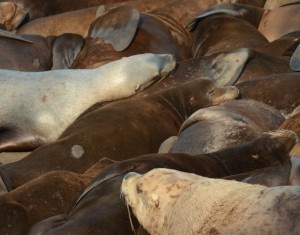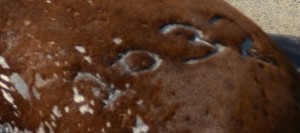Tomorrow is the equinox and it was a glorious last day of summer today on Race Rocks. In the morning, outflow northeasterly winds soon gave way to westerlies, which gained momentum creating whitecaps and active seas in the afternoon. Both yesterday and today there was also an ocean swell, indicating a storm out at sea. Some of the surges created large, standing waves in the tidal flows. The barometer continued slide today and a change is on the way with showers forecast to start by tomorrow evening.
There were only a few whale-watching boats today, four observed in total. The Ogden Point Dive Centre’s charter boat ran a dive right off the jetty today. A few recreational boats stopped to watch the sea lions and three were speeding in the reserve, as they came into and left the area. A Pedder Bay, Oak Bay Marine Group rental boat didn’t bother to slow at all and sped through the area packed with sea lions.
After picking up calipers at the floating lab, I was able to almost complete meristic data collection for the Glaucous-wing Gull mortality study. Measurements were made of over 50 gulls in order to determine the age range and location at death. It has been so dry for so long, that the birds were basically mummified, not nearly as gross as standing up-wind of the living sea lions.
Several opportunistic brand photos were taken today and census photos were taken to validate against the more traditional census technique.
It seems that more Steller’s Sea Lions, Thayer’s Gulls and Double-crested Cormorants are arriving daily As you can see from this photograph of one the main California Sea Lion sleeping areas they are packed in tightly and not strictly segregated by species.

Sea lions pack into sleeping areas. This big Steller’s Sea Lion caused a ruckus by walking over the Californians.
The more mundane tasks of washing the solar panels, building up the compost, washing windows and mending the fences were done in the morning and it was actually hot, hmmm, just like summer. The seawater data was collected in the afternoon as the sunshine powered the solar panels which in turn powered the desalinator to make fresh water out of salt water. As the sun set south of Cape Flattery now, the classic Lister generator topped up the batteries for the overnight period.

